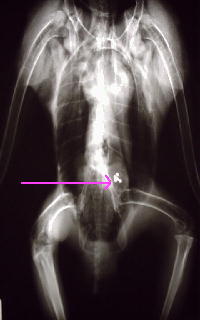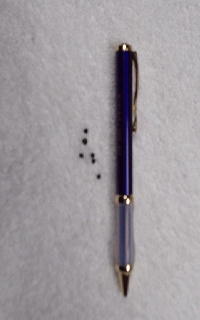

Our first bald eagle of the new year, BE 05-01 came to us from Kenai, Alaska. He was given a physical exam while under sedation and it revealed that the first 2/3 of the birds tongue was necrotic. It was presumed that the bird had ingested some sort of chemical that was causing the illness.
The birds condition deteriated since he arrived despite IV fluids, vitamins and forced feeding.
Blood work performed indicated a high probability of heavy metal toxicity, ie lead or zinc. The blood glucose was incredibly high, perhaps causing the necrosis of the tongue.
X-rays were taken on 1/17 and showed bird shot in the lower stomach area. He wasn't shot but ate something that had been shot. Surgery was performed by both Dr Wilson & Dr Palmatier of Pet Stop. They removed 6 lead pellets.
The prognosis is poor, but he looks better than when I first saw him. He's reacting to anything compared to nothing. He requires IM injections of Calcium EDTA three times daily for 5 days. Due to surgery he will need to be tube feed for 5 days, twice daily.
Now, my 2 cents.
First, thanks to Dr Wilson & Dr Palmatier for the surgery. Time & expenses was donated by both. You guys are awesome.
Second, Thanks to Pet Emergency Clinic of Anchorage for donating 3 vials of Calcium EDTA. You got him the medication he needed right away.
Third, Hunting, recreational shooting, and fishing deposit thousands of tons of lead ammunition and tackle into the environment annually, exposing dozens of bird species and other wildlife to the toxic effects of lead poisoning. Many animals are directly exposed to lead when they mistake fragments for food or grit. Waterfowl, shorebirds, upland game birds, small mammals and songbirds often consume lead shot or fishing sinkers when they browse for small pebbles, seeds, or other food items. Raptors and other predatory animals are subject to secondary poisoning by preying on lead-laden birds and mammals, or by scavenging contaminated carcasses.
Lead absorbed into the blood stream causes severe health consequences including neurological disorders, seizures, infertility, anemia, soft tissue damage, birth defects and death. Animals that do not die directly from lead poisoning may face sub-lethal effects of lead toxicity, such as neurological and organ damage, that ultimately contribute to their inability to survive in the wild.
Explore non-lead alternatives for ammunition and fishing tackle. Voluntary change to non-toxic substitutes will help keep the environment free of poisons and give outdoor enthusiasts the gratifying opportunity to preserve the nature that they dearly treasure.
Here's a link to HawkWatch Internationals, Life Without Lead.
ACTION ALERT * ACTION ALERT * ACTION ALERT * ACTION ALERT *
Bird TLC can use some assistance paying for the medication for this bird. Pet Emergency Clinic donated what they had. 3 more vials of Calcium EDTA is needed. The pharmacy bill is $146.34. If you can help out, contact the Bird TLC Office immediately @ 907-562-4852. Thanks!
ACTION ALERT * ACTION ALERT * ACTION ALERT * ACTION ALERT *
No comments:
Post a Comment